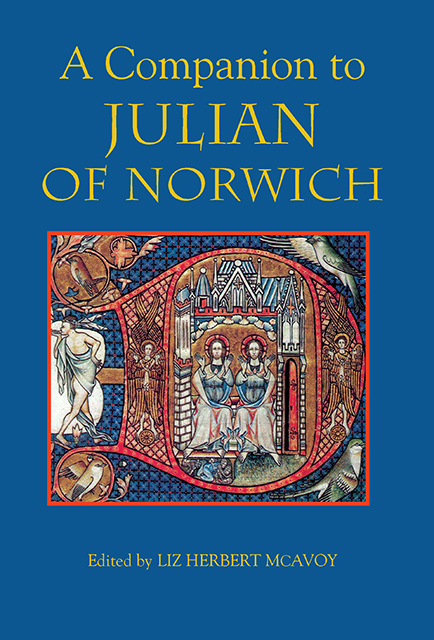15 - ‘[S]he do the Police in Different Voices’: Pastiche, Ventriloquism and Parody in Julian of Norwich
Published online by Cambridge University Press: 10 March 2023
Summary
‘Catholicism was language itself, a complete set of images, and such a rich one, with which to live and name the world.’ Michèle Roberts in Walking on the Water: Women Talk About Spirituality, ed. Jo Garcia and Sara Maitland (London, 1983), p. 59.
Many scholars and readers of Julian have puzzled over the strangeness of her text's structure and the curiously recursive and apparently involuted way that she expounds her showings. Right from the outset, she challenges standard interpretative strategies with her claim in the first chapter of the Long Text that the showing of the Crown of Thorns both ‘comprehended and specified the blessed Trinity’ in which ‘all the shewinges that foloweth be groundide and oned’. This is typical of her dizzying changes of visual and intellectual perspective: both comprehensive and specific; effortlessly moving from image (crown) to abstraction (Trinity); grounding and unifying all that follows in a single metaphor. The linear analytical approach – schematizing, programming, spotting theological sources and rhetorical conventions – struggles to respond to this kind of discourse. Her text seems actively to resist this kind of scholastic reading. Instead Julian's dominant imagery speaks of enfolding, embracing and enclosing, invoking an all-encompassing three-dimensional aesthetic: ‘He is oure clothing that for love wrappeth us, and windeth us, halseth us and all becloseth us, hangeth about us for tender love’ (Revelation, 5.3–4).
This does not mean that the linearity of the standard critical method is totally excluded, but the range of textual voices she uses, and her subtle and strategically shifting nuances of style and register, demand a different way of listening. More profitable is a version of an ancient monastic form of dialogue with the text derived from lectio divina (divine reading) of Scripture, traditionally described as rumination or meditation. Just as monastic reading generates what Jean Leclercq calls the ‘literature of reminiscence’, so we must become sensitized to the nuances and verbal play of Julian's text, so that key ideas and concepts (such as ‘enclosing’ or ‘beholding’) begin to resonate together.
The showings seem to have required from Julian an acutely attentive stillness (she calls this paradoxical state ‘willful abiding’) and the suspension of her hermeneutic preconceptions. Julian's text demands from its readers these same qualities.
- Type
- Chapter
- Information
- A Companion to Julian of Norwich , pp. 192 - 207Publisher: Boydell & BrewerPrint publication year: 2008
- 5
- Cited by

